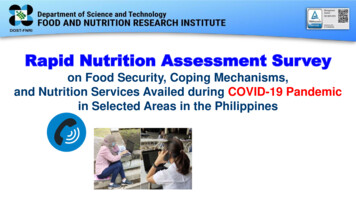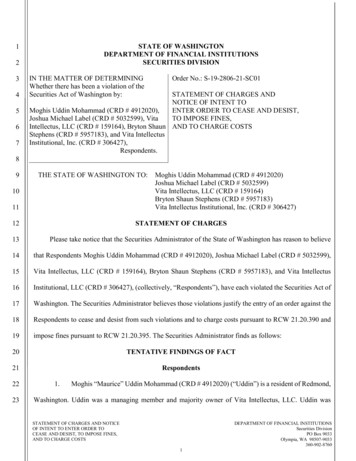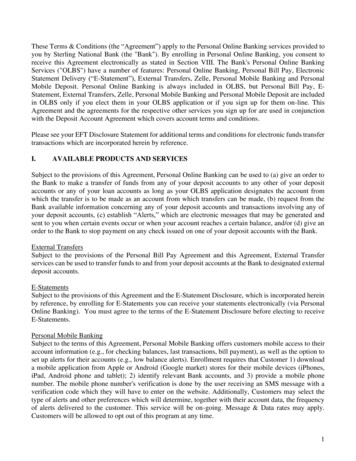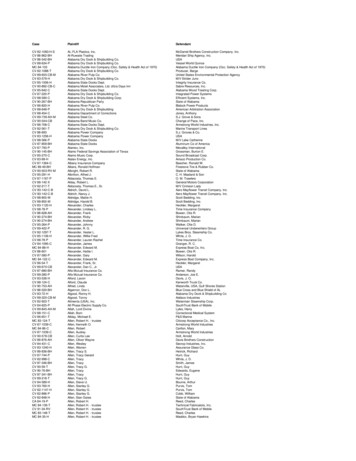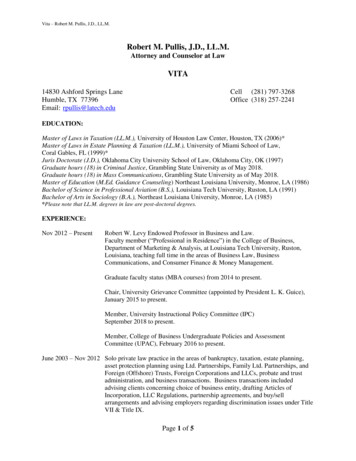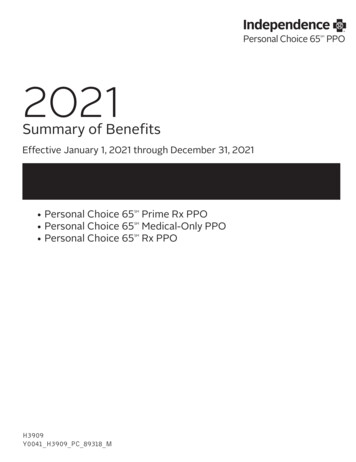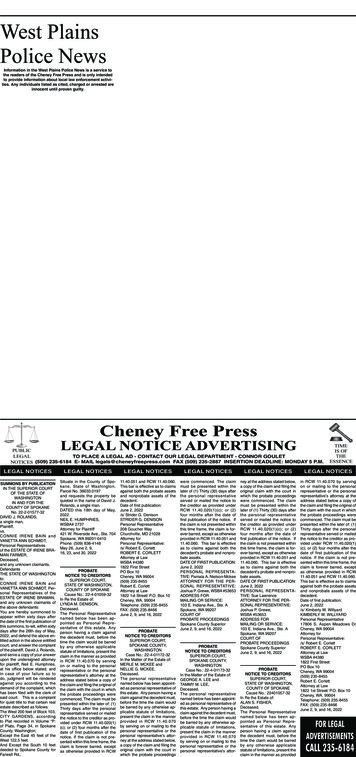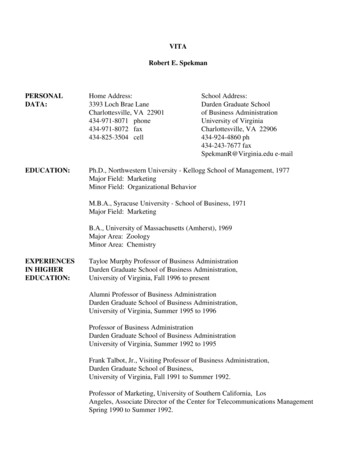
Transcription
VITARobert E. SpekmanPERSONALDATA:Home Address:3393 Loch Brae LaneCharlottesville, VA 22901434-971-8071 phone434-971-8072 fax434-825-3504 cellSchool Address:Darden Graduate Schoolof Business AdministrationUniversity of VirginiaCharlottesville, VA 22906434-924-4860 ph434-243-7677 faxSpekmanR@Virginia.edu e-mailEDUCATION:Ph.D., Northwestern University - Kellogg School of Management, 1977Major Field: MarketingMinor Field: Organizational BehaviorM.B.A., Syracuse University - School of Business, 1971Major Field: MarketingB.A., University of Massachusetts (Amherst), 1969Major Area: ZoologyMinor Area: ChemistryEXPERIENCESIN HIGHEREDUCATION:Tayloe Murphy Professor of Business AdministrationDarden Graduate School of Business Administration,University of Virginia, Fall 1996 to presentAlumni Professor of Business AdministrationDarden Graduate School of Business Administration,University of Virginia, Summer 1995 to 1996Professor of Business AdministrationDarden Graduate School of Business AdministrationUniversity of Virginia, Summer 1992 to 1995Frank Talbot, Jr., Visiting Professor of Business Administration,Darden Graduate School of Business,University of Virginia, Fall 1991 to Summer 1992.Professor of Marketing, University of Southern California, LosAngeles, Associate Director of the Center for Telecommunications ManagementSpring 1990 to Summer 1992.
Robert E. SpekmanPage 2Associate Professor of Marketing (with tenure), University of SouthernCalifornia, Los Angeles, Associate Director of the Center for TelecommunicationsManagement Fall 1988 to Summer 1990.Associate Professor of Marketing, University of Southern California, Los Angeles,Associate Director of the Center for Telecommunications Management Fall 1986 toSummer 1988.Associate Professor of Marketing (with tenure), University of Maryland at CollegePark, Fall 1981 to Spring 1986.Visiting Professor of Marketing, Norwegian School of Economics and BusinessAdministration, Bergen, Norway, August 1982 to May 1983.Assistant Professor of Marketing, University of Maryland at College Park, Fall 1976to Summer 1981.Lecturer, Northwestern University, Summer 1975.Lecturer, Loyola University of Chicago - Graduate School of Business, Summer 1974.Research Assistant, Graduate School of Management, Northwestern University,September 1974 - June 1976.EXPERIENCEIN OTHERTHAN HIGHEREDUCATION:PROFESSIONALACTIVITIES:Corporate Marketing Staff Member, The Stop and Shop Companies, Inc, Boston,September 1972 - December 1973.Administrative Trainee, The Stop and Shop Companies, Inc., Boston, July 1971 September 1972.Associate Editor, Journal of Business-to-Business Marketing, 1990 to present.Editorial Board (Past): Journal of Marketing, July 1981 to 1997; Journal of PersonalSelling and Sales Management, 1982 to 1990.Editorial Board (Present): Journal of the Academy of Marketing Science, 1998;Supply Chain Management, 1999; Journal of Market Focused Management, 1995;Journal of Supply Chain Management, 2001.Co-editor of a special topics section of Industrial Buying Behavior for the Journal ofBusiness Research, 1980, 1984-1986, 1990, 1991-1992, 1994Outside reviewer, Journal of Marketing Research, 1984 to present; Journal ofManagement Studies, 1996 to present; International Journal of Research in Marketing,2001 to present; Administrative Science Quarterly, 1980, 1985; Journal of Consumer
Robert E. SpekmanPage 3Research, 1985 to present; Academy of Management Journal, 1993 to present;Journal of the Academy of Marketing Science, 1994, 1997-89; Journal of Retailing,1992 to present; Strategic Management Journal, 1997 to present; Sloan ManagementReview, 1994.Teaching Faculty, ISBM PhD Consortium on B2B Marketing 2005, FacultyConsortium on Industrial Marketing, American Marketing Association, 1982 and2000; Doctoral Consortium, American Marketing Association, 1985; FacultyConsortium on Relationship Marketing, 1994.Chair (with Jakki Mohr), American Marketing Association sponsored Business-toBusiness Marketing Research Conference, 1993.Chair (with D. Wilson), 1990 Winter AMA Educators’ Conference.Coordinator (with G. Ford) of 1981 American Marketing Association’s DoctoralConsortium.Coordinator (with D. T. Wilson, Penn State) of 1981 and 1984 American MarketingAssociation sponsored workshop on Industrial Marketing.Industrial Steering Committee, Marketing Science Institute, Fall 1984-1992.Track Chair for Marketing Strategy, 1989 AMA Educators’ Conference.Session Chairperson: Association for Consumer Research, 1977; American MarketingAssociation, 1980, 1982, 1987, 1988, 1990.Coordinator: Executive Development Program for the National Cancer Institute(NIH), 1979; Executive Development Program for the Office of the AssistantSecretary for Public Affairs, DHHS, 1980, 1981.Discussant, American Marketing Association Educator’s Conference, 1981, 1982,1988, 1993, 1994.Proposal Evaluator: Department of Energy, Public Utilities Regulatory Policies Act(PURPA), 1979; Department of Energy, Innovative Rates Program, 1980; NationalScience Foundation, 1981, 1986, 1987.Manuscript Reviewer, Addison-Wesley, C. W. Brown, Dryden Press, Allyn andBacon, Times Mirror-Mosby, Richard Irwin, West Publishers, MacMillan, McGrawHill, Prentice Hall, Harvard Business Press.HONORS ANDAWARDS:International Journal of Physical Distribution & Logistics Management, 2010 awardfor being one of top 20 downloaded papers in the Journal from its inception
Robert E. SpekmanPage 4International Journal of Physical Distribution & Logistics Management,2010 award forbeing one of the top downloaded papers in the Journal for the last three yearsJournal of Business-to-Business Marketing, 2004 outstanding article of the Year, withD. Eric BoydDarden School’s Wachovia Award for Research Excellence in a Book—The ExtendedEnterprise: Gaining Competitive Advantage through Collaborative Supply Chains(with Edward Davis) 2004Darden School’s Wachovia Award for Research Excellence in a Book-- AllianceCompetence: Maximizing the Value of Your Partnerships (with Lynn Isabella andThomas MacAvoy) 2000Supply Chain Management, vol. 3, #2, 53-67, 1998. Received 1999 MCB awards forexcellence as the most outstanding paper in the journal.Supply Chain Management, vol. 7 1,41-55, 2002. Received the 2002 MCB awardsfor excellence as the most outstanding paper in the journal. Also, cited as one of the200 most downloaded papers in the Emerald family of journalsDarden School’s Wachovia Award for Excellence-- Volvo Renault Case Series (withR. Bruner) 1997European Journal of Marketing, vol. 31, #11/12, 832-56, 1997. Selected as a MCBDistinguished Award for Excellence in 1998.European Case Competition, Awarded First Runner-Up in for Renault -Volvo caseseries with Robert Bruner), 1995-1996.Phi Kappa Phi Research Mentorship Award, University of SouthernCalifornia, 1992.Distinguished Visiting Scholar Lecture Series, Arizona State Univ. 1989Distinguished Faculty Award presenting by College of Business and ManagementAlumni International, University of Maryland, 1985.Outstanding Faculty Award presented by the University of Maryland MBA students1981, 1985, 1986.Undergraduate Teaching Award presented by College of Business and Management,1983, 1984.Graduate Teaching Award presented by College of Business and Management, 1984,1985, University of Maryland.Research Board Award, University of Maryland, 1977.Graduate School of Management Fellowship, Northwestern University, 1974-76.
Robert E. SpekmanPage 5GRANTS ANDCONTRACTS:Undergraduate Admissions Office, University of MarylandCollege Park, 1977 to 1979 (with P. N. Bloom).The study investigated the college choice process. The research encompassed amarket audit of the admissions process as well as the collection to survey data fromrandom samples of current students, prospective college students and students whowere admitted but not enrolled at UMCP.Bureau of Community Health Services, Health Services Administration (DHEW),1979 to 1980 (with G. T. Ford) - Contract HSA 78-104(1).A field experiment, conducted at one of BCHS’s rural health sites, was designed toincrease the level of immunization among the clinic’s population of children underfour years of age.Office of the Secretary, Department of Health and Human Services Management,Planning and Evaluation Division, 1980, 1981 - Contract SA80-5921 and SA81-1302.Development of a curriculum for a conference entitled “Managing Public Informationand Education Techniques.” The purpose of the conference is to provide PublicAffairs Professionals with a working knowledge of social marketing tools andconcepts.National Association of Purchasing Management (NAPM), 1981-1982.Faculty Research Grant awarded to examine issues relevant to strategic procurementin the 1980s. A survey of 1,600 members were conducted.Graduate School, University of Maryland, College Park, 1984.An empirical investigation of graduate student’s decision processes for graduateschool. A survey was administered to all students’ accepted to the various graduateprograms at the College Park campus. Recommendations were made to the Dean ofthe Graduate School.Marketing Science Institute, Cambridge, MA, 1985.An empirical investigation of collaborative relationships within the buyer-seller dyad.The goal of the project is to understand better the nature, evolution and maintenanceof closer, more cooperative trading relations between buyers and sellers.Allied-Bendix Corporation, Arlington, VA 1986.An examination of the relationship between contractors and subcontractors. Thepurpose of this research is to understand better the strategic and procurement decisionsthat drive the type and closeness of the relationship, which evolves betweencontractors and their subcontractors.IBEAR Program, University of Southern California, 1987.An empirical investigation of buyer-seller relationships in an international context.The purpose of this project is to understand both U.S. buyers’ and Pacific Rim sellers’
Robert E. SpekmanPage 6expectations when forming and maintaining long-term collaborative relationships. Asample of U.S., South Korean, and Taiwanese managers will be examined.Center for Advanced Purchasing Studies/NAPM, 1987.A grant was awarded to defray mailing expenses incurred as part of the IBEARproject. These funds supported the U.S. buyers’ portion of the project.Bell Communications Research, Livingston, NJ, 1988.Development of a methodology for assessing customer satisfaction within the publictelephone market. In addition, strategic implications will be explored. (ValerieFolkes is co-investigator).Marketing Science Institute, Cambridge, MA, 1988.A seed grant was awarded to begin an empirical investigation of multi-pointrelationships between companies. A goal of the project is to understand better therelationship between companies that often find themselves interacting as both partnersand competitors.Marketing Science Institute, Cambridge, MA, 1989. A seed grant was awarded todevelop a position paper on the state of industrial advertising. Through a series ofexecutive interviews, issues will be generated and research agenda posited. This is thefirst of several phases. (Co-investigator is David Stewart).International Consortium for Executive Development Research, Lexington, MA ,1993 and 1994. A grant was awarded to study strategic alliances over their life cyclesand to assess the differences in managerial intent and skill required as the allianceproceeds through its life. Eight alliances, at different life cycle stages, are to beexamined through in-depth qualitative methods. (Co-investigators are Lynn Isabellaand Tom MacAvoy.)International Consortium for Executive Development Research, Lexington, MA ,1994-96. A second round grant was awarded to study strategic alliances over their lifecycles and to assess the differences in managerial intent and skill required as thealliance proceeds through its life. Eight alliances, at different life cycle stages, are tobe examined through in-depth qualitative methods. (Co-investigators are LynnIsabella and Tom MacAvoy.)Ernst & Young, Cleveland Ohio, 1994-96. A grant was awarded to examine bestpractices in the area of supply chain management with an emphasis on collaboration.This is a global empirically based study. (Co-investigator is John Kamauff fromWestern Business School).MasterCard International, 1995-96. A grant was awarded to study the future of theconsumer payments industry with particular emphasis on the future role of alliancesand networks.
Robert E. SpekmanPage 7PUBLICATIONS:Books and Edited Proceedings:Robert E. Spekman and David T. Wilson (eds.), Issues in Industrial Marketing: AView to the Future. Chicago: American Marketing Association, 1982.Robert E. Spekman and David T. Wilson (eds.), A Strategic Approach to BusinessMarketing. Chicago: American Marketing Association, 1985.Paul Bloom, Bart Weitz, et. al. (eds). 1989 AMA Summers’ Educators’ ConferenceProceedings. Chicago: American Marketing Association, 1989.J. David Lichtenstein, R. Spekman, D. Wilson, et al. (eds.) 1990 AMA WinterEducator’s Conference Proceedings: Marketing Theory and Applications, Chicago:American Marketing Association, 1990.Robert E. Spekman, Lynn Isabella, Thomas MacAvoy and Theodore Forbes (1997),Alliances and Partnership Strategy, Cambridge, MA: ICEDR.Robert Bruner, Mark Eaker, R. Edward Freeman, Robert Spekman, Elizabeth O.Teisberg (1997), The Portable MBA, 3rd edition, New York, NY: John Wiley andSons. The fourth edition was released in Feb. 2003.Robert E. Spekman and Lynn A. Isabella with Thomas MacAvoy, AllianceCompetence Maximizing the Value of Your Partnerships, New York: John Wiley andSons, 2000.Edward W. Davis and Robert E. Spekman, The Extended Enterprise: The Key toSupply Chain Alliances, Partner Leverage, and Competitive Advantage, New York,Prentice Hall Financial Times, Fall 2003O. Ploetner and Robert Spekman (eds.), Bringing Technology to Market, John Wileyand Sons, Germany 2006.Published in Refereed Journals:Robert E. Spekman, and G. T. Ford, “Perceptions of Uncertainty Within BuyingGroups.” Industrial Marketing Management, Vol. 6, 1977, 395-403.Robert E. Spekman, “Influence and Information: An Exploratory Investigation of theBoundary Role Person’s Basis of Power,” Academy of Management Journal, Vol. 22,1979, 104-117.Robert E. Spekman and Louis W. Stern, “Environmental Uncertainty and BuyingGroup Structure: An Empirical Investigation,” Journal of Marketing, Vol. 43, 1979,54-64.
Robert E. SpekmanPage 8Robert E. Spekman, “The Purchasing Audit: A Guide for Management,” Journal ofPurchasing and Materials Management, Vol. 15, 1979, 8-12. (Reprinted in a 1980Commemorative issue: an outstanding articles to appear in the Journal since 1975).Jack Kasulis and Robert E. Spekman, “A Framework for the Use of Power,” EuropeanJournal of Marketing, Vol. 14, 1980, 180-191.Robert E. Spekman and Ronald Hill, “Strategic Purchasing: An Approach forDealing Effectively with Procurement in the 1980s,” Journal of Purchasing andMaterials Management, Vol. 16, 1980, 2-8.R. E. Spekman, “The Effect of Organizational Type on Organizational Buying:Implications for the Industrial Marketer,” Industrial Marketing Management, Vol. 10,1981, 43-48.Robert E. Spekman, “A Strategic Approach to Procurement Planning,” Journal ofPurchasing and Materials Management, Vol. 17, 1981, 2-9. (Reprinted in a 1989 25thanniversary edition and recognized as one of the outstanding contributions to thejournal.)Wesley Johnston and Robert E. Spekman, “Industrial Buying Behavior: A Need foran Integrated Approach,” Journal of Business Research, Vol. 10, 1982, 133-146.Robert E. Spekman, “An Empirical Investigation of Strategy Implementation,”International Journal of Physical Distribution and Materials Management, Vol. 13,1983, 38-48.Rowland T. Moriarty, Jr. and Robert E. Spekman, “An Empirical Investigation of theSources of Information Utilized During the Industrial Buying Process,” Journal ofMarketing Research, Vol. 21, 1984, 137-148.Robert E. Spekman, “Purchasing’s Contribution to Corporate Planning: A NeglectedDimension,” Long-Range Planning, Vol. 18, 1985, 94-99.Robert E. Spekman and Kjell Gronhaug, “Methodological Issues in Buying CenterResearch,” European Journal of Marketing, Vol. 20, 1986, 50-63.Robert E. Spekman and Wesley Johnston, “Relationship Management: Managing theSelling and Buying Interface,” Journal of Business Research, Vol. 14, 519-531, 1986.Robert E. Spekman and Deborah Strauss, “An Exploratory Investigation of a Buyer’sConcern for Factors Affecting More Collaborative Buyer-Seller Relationships,”Industrial Marketing and Purchasing, Vol. 13, 26-43, 1986.Robert E. Spekman, “Strategic Supplies Selection: Towards an Understanding ofLong-Term Buyer-Seller Relationships,” Business Horizons, 31, 1988, 75-81.
Robert E. SpekmanPage 9Gary Frazier, R. E. Spekman and C. O’Neal, “Just-In-Time Exchange Relationships inIndustrial Markets,” Journal of Marketing, 52, 1988, 52-67.Robert E. Spekman, “Perceptions of Strategic Vulnerability Among Industrial Buyersand Its Effect on Information Search and Supplier Evaluation,” Journal of BusinessResearch, 17, 1988, 313-326.Robert E. Spekman, “An Exploratory Investigation of U.S. Buyers’ Relationships withPacific Rim Sellers,” Journal of Purchasing and Materials Management, 21, 1991, 211.R. Krapfel, D. Salmond, and R. E. Spekman, “A Strategic Approach to ManagingBuyer-Seller Relationships,” European Journal of Marketing, 25 #9, 1991, 22-37.Ven Sriram, Robert Krapfel and Robert E. Spekman, “Antecedents to Buyer-SellerCollaboration: An Analysis from the Buyer’s Perspective,” Journal of BusinessResearch, 25, #4, 1992, 303-320.Kathleen K. Reardon and Robert E. Spekman, “Starting out Right: NegotiationLessons for Domestic and Cross-Cultural Alliances,” Business Horizons, JanuaryFebruary, 1994, 71-78.Mohr, Jakki, Gregory T. Gundlach, and Robert Spekman (1994), “Legal Ramificationsof Strategic Alliances,” Marketing Management, Vol. 3 (2), 38-46.Jakki Mohr and Robert E. Spekman, “Characteristics of Partnership Success:Partnership Attributes, Communications Behavior, and Conflict ResolutionTechniques,” Strategic Management Journal, vol 15, 1994, 135-152.Robert E. Spekman, John Kamauff, Deborah Salmond, “At Last Purchasing BecomesStrategic,” Long-Range Planning, April, 27 #2,1994, 76-84.Robert E. Spekman, David Stewart and Wesley J. Johnson, "BuyingCenter Role Designation: An Empirical Investigation of the PurchasingManager's Role Formation and Its Correlates," Journal of Business-toBusiness Marketing, 1995, 2 (4), 37-63.Mohr, Jakki and Robert Spekman (1996), "Perfecting Partnerships," MarketingManagement, 4 (Winter/Spring), pp. 34-43.R .E. Spekman, D. Salmond and J. Lambe, Consensus and Collaboration: NormRegulated Behavior in Industrial Marketing Relationships, European Journal ofMarketing, vol. 31, 11/12/ 832-56. Winner of best paper in marketing for the MCBfamily of journals in 1998.
Robert E. SpekmanPage 10C. Jay Lambe and Robert E. Spekman, “Alliances, External Technology Acquisition,and Discontinuous Technological Change,” Journal of Product InnovationManagement, 14, 102-116, 1997Robert E. Spekman, Lynn Isabella, Tom MacAvoy, Ted Forbes, “Creating StrategicAlliances that Endure,” Long-Range Planning, vol. 29, #3, 1996, 346-357.C. Jay Lambe and Robert E. Spekman, “National Account Management: LargeAccount Selling or Buyer-Supplier Alliance,” Journal of Personal Selling and SalesManagement, Fall 1997, vol. 17, #4, 61-74.R. Bruner and Robert Spekman, The Darker Side of Alliances: Lessons from VolvoRenault, European Management Journal, 16 #2, 136-50, April 1998. (Received 2003Citation for excellence by MCB editors.)Robert Spekman, John Kamauff and Niklas Myhr, “An Empirical Investigation intoSupply Chain Management: A Perspective on Partnerships,” Supply ChainManagement, vol. 3, #2, 53-67, 1998. Also, appeared in International Journal ofPhysical Distribution & Logistics Management, Volume 28 (1998), Number 8.Selected as 1999 MCB awards for excellence as the most outstanding paper in thejournal .Also, received the 2010 citation for being one of the top 20 downloadedpapers in the journal.Robert E. Spekman, Lynn Isabella, Thomas MacAvoy, and Theodore Forbes,“Alliance Management: A View from the Past and a Look to the Future,” Journal ofManagement Studies, vol. 35, #6, 747-771, 1998. (Received 2003 Citation forexcellence by MCB editors.)Robert Spekman, John Kamauff and Joseph Spear, “Towards More Effective Sourcingand Supplier Management,” European Journal of Purchasing and SupplyManagement, vol. 5, 103-116, 1999.Kirti Sawhney Celly, Robert E. Spekman and John Kamauff, “TechnologicalUncertainty, Buyer Preferences, and Supplier Assurances: An Examination of PacificRim Purchasing Arrangement,” Journal of International Business Studies, vol. 30, 2,297-316, 1999. (Received 2003 Citation for excellence by MCB editors.)Kamalini Ramdas and Robert Spekman, “Shackles or Chains: Understanding WhatDrives Supply Chain Performance,” Interfaces, vol. 30, #4, 1999, 3-21.Wesley Johnston, Jeffrey Lewin and Robert Spekman, “International IndustrialMarketing Interactions: Dyadic and Network Perspectives,” Journal of BusinessResearch, vol. 46 (3), 257-71, 1999.C. Jay Lambe, Robert E. Spekman and Shelby D. Hunt, “Interimistic Relational
Robert E. SpekmanPage 11Exchanges: Conceptualization and Propositional Development “ Journal of theAcademy of Marketing Science, vol. 28, #2, 2000, 212-215Robert Spekman, “A Commentary on Business Marketing: A Twenty Year Reviewand an Invitation for a Continued Dialog,” Journal of Business-to-Business Marketing,vol.7 (4), 11-32, 2000.C. J. Lambe, C. M. Wittmann and Robert E. Spekman, “ Social Exchange Theory andResearch on Business-to-Business Relational Exchange,” Journal of Business-toBusiness Marketing, Vol. 8. no. 3, 1-36, 2001Robert E. Spekman, Joe Spear and John Kamauff, “Supply Chain Competence:Learning as a Key Component,” Supply Chain Management, vol. 7 1,41-55, 2002.Received the 2003 MCB awards for excellence as the most outstanding paper in thejournal.C. J. Lambe, R. E. Spekman, and Shelby Hunt, “Alliance Competence, Resources andAlliance Success: Conceptualization, Measurement and Initial Test, “ Journal of theAcademy of Marketing Science, vol. 30, #2, 114-158, 2002.Paul Cousins and Robert Spekman, “Strategic Supply and the Management of Interand Intra Organizational Relationships,” Journal of Purchasing and SupplyManagement, Vol. 9 19-29, 2003D. Eric Boyd and Robert Spekman, Internet Usage within B2B Relationships and itsImpact on Value Creation: A Conceptual Model and Research Propositions” Journal ofBusiness-to-Business Marketing, vol. 11 no. 1-2, 8-32, 2004 Awarded the 2004Outstanding article of the Year.Kamauff, John, Darlene B. Smith and Robert Spekman (2004), “Extended EnterpriseMetrics: The Key to Achieving Synthesized Effectiveness,” Journal of Business andEconomics Research, Vol. 2, No. 5 (May) 39-52.Robert E. Spekman and Edward Davis, "Risky Business: Expanding theDiscussion on Risk and the Extended Enterprise", International Journal ofPhysical Distribution and Logistics, vol. 34, no. 5, July 2004, 414-433.Niklas Myhr and Robert E. Spekman, "Collaborative Supply Chain Partnerships BuiltUpon Trust and Electronically-Mediated Exchange" Journal of Business and IndustrialMarketing, vol. 20, # 4-5, 179-186, 2005.Robert Spekman and Robert Carraway, “Making the Transition to CollaborativeBuyer-Seller Relationships: An Emerging Framework,” Industrial MarketingManagement, vol. 35, #1, 10-19, 2006.
Robert E. SpekmanPage 12Robert Spekman and Patrick Sweeney II , “RFID: From Concept to Implementation,”International Journal of Physical Distribution and Logistics, 2006, vol. 36, no. 10, 736754. Winner of the 2009 and 2010 award for being among the top 20 downloadedpapersD. Eric Boyd, Robert Spekman, John Kamauff, and Patricia Werhane, “CorporateSocial Responsibility in Global Supply Chains: A Procedural Justice Perspective,”Long Range Planning, vol. 40, 341-356, 2007.John Kamauff and Robert Spekman, “The LCCS Success Factors,” Supply ChainManagement Review, January/February 2008, 14-21Mark Parry, Michael Song and Robert Spekman, “Task Conflict, Integration Potential,and Conflict Management Strategies in Joint Ventures”, IEEE Transactions onEngineering Management, Vol. 55, No. 2, May 2008, 1-18.D. Eric Boyd and Robert Spekman,” "The Market Value Impact of Indirect Ties withinTechnology Alliances," Journal of the Academy of Marketing Science, vol. 36, 2008,488-500.Stephen Melnyk, Ed Davis, Robert Spekman and Joe Sandor, “Outcome DrivenSupply Chains,” Sloan Management Review, Winter 2010 vol 51 (2), 33-38.Boyd, D. Eric and Robert E. Spekman (2010), “The Licensing of Marketing ControlRights in Technology Alliances: A Shareholder Value Perspective,” Journal ofProduct Innovation Management, 27 (4), 593-605.Refereed Papers in Conference Proceedings:Robert E. Spekman, “An Examination of Informal Decision-Making Units: SomeMethodological Cautions for Future Research,” Proceedings of the Academy ofManagement, 1977, 213-217.Robert E. Spekman and B. J. Calder, “Narrowing the Conceptual-Empirical Gap inOrganizational Buying Behavior,” in H. K. Hunt (ed.), Advances in ConsumerResearch, Vol. 5, Association for Consumer Research, 1977, 213-217.Robert E. Spekman, “The Purchasing Manager--From Order-Taker to DecisionMaker: Some Preliminary Findings,” in B. Greenberg and D. Bellenger (eds.),Contemporary Marketing Thought. Chicago: American Marketing Association, 1977,502.Robert E. Spekman, “A Macro-Sociological Examination of the Industrial BuyingCenter: Promise or Problems?” in S. Jain (ed.), Research Frontiers in Marketing:Dialogue and Directions. Chicago, American Marketing Association, 1978, 111-115.
Robert E. SpekmanPage 13Robert E. Spekman and P. N. Bloom, “Obstacles to Conducting a Non-ProfitMarketing Audit,” in R. Franz et al., SMA Proceedings, 1979, 422-425.Robert E. Spekman, J. Harvey and P. N. Bloom, “The College Choice Process: SomeEmpirical Results,” in J. Olson (ed.), Advances in Consumer Behavior, Vol. 7,Association for Consumer Research 1979, 700-705.Robert E. Spekman and G. T. Ford, “The Industrial Marketing Implications ofOrganizational Hierarchy in Purchasing Departments,” in K. Bernhardt et al. (eds.),The Changing Marketing Environment: New Theories and Applications. Chicago:American Marketing Association, 1981, 178-182.Robert Krapfel, Robert Spekman, and Gabrielle Belli, “Experimental Causal Researchin Organizational Buying Behavior: A Cautionary Note,” in Wm. Darden et al. (eds.),Research Methods and Causal Modeling in Marketing. Chicago: AmericanMarketing Association, 1983, 55-57.Robert E. Spekman and Kjell Gronhaug, “Insights on Implementation: A ConceptualFramework for Better Understanding the Strategic Marketing Planning Process,” inP. Murphy et al. (eds.) American Marketing Association Proceedings. Chicago:American Marketing Association, 1983, 12-16.Robert E. Spekman and Rowland Moriarty, “An Exploratory Investigation ofPerceived Time Pressure and Its Effect on Industrial Buying Behavior,” in K. Moller(ed.) Proceedings of the European Academy of Marketing, 1986, 681-696.Deborah Salmond and R. E. Spekman, “Collaboration as a Mode of Managing Longterm Buyer-Seller Relationships,” in T. Shimp, et al. (eds.) AMA MarketingEducators’ Conference Proceedings, Chicago: AMA, 1986, 205-211.R. Krapfel and R. Spekman, “Channel Power Sources, Satisfaction and Performance:An Exploration,” in Mark Albert et al. (eds.), American Marketing AssociationProceedings. Chicago: AMA, 1987, 30-34.R. Spekman and David Wilson, “Managing Strategic Partnerships: Towards anUnderstanding of Control Mechanisms and Their Impact on Partnership Formationand Maintenance,” Proceedings 6th I.M.P. Conference, Milan, Italy, 1990, 1000-1017.D. Stewart and R. E. Spekman, “A Systematic Inquiry Into Business-to-BusinessAdvertisement: An Early Assessment,” R. Holman and Patricia Stout (eds.),Proceedings of the American Academy of Advertising, 1991, 201-202.Robert Spekman and David Wilson, “ The Alliance Manager: An Essential Ingredientto Alliance Success,” in Proceedings of the Seventh Bi-Annual World MarketingConference, Melbourne, Australia, 1995, 52-54.
Robert E. SpekmanPage 14John Kamauff, Robert E. Spekman, and Jeffrey R. Edwards, “The Robustness of NPDSourcing Strategy,” in Research at the Marketing/Entrepreneurship Interface, GeraldE. Hills, Daniel F. Muzyka, Glenn S. Omura, and Gary A. Knight (eds.). Chicago:Institute for Entrepreneurial Studies, 1995, 227-231.C. Jay Lambe and Robert E. Spekman, “First Mover Advantage and A Considerationof Alliances,” in Roger Calatone and Cornelia Droge (eds.), Enhancing KnowledgeDevelopment in Marketing, Vol. 7, Chicago: American Marketing Association, 1996,Lambe, C. Jay and Robert E. Spekman, “The Bases of Alliance-Derived SustainableCompetitive Advantage: Relationship and Resources,” 1997 American MarketingAssociation Winter Marketing Educators Conference Proceedings, February 1997.Niklas Myhr and Robert E. Spekman, “Functional Cooperation in Supply Chains:Determinants and Consequences,” 1997 American Marketing Association SummerMarketing Educators Conference Proceedings, August 1997.Niklas Myhr and Robert E. Spekman, “Supply Chain Functional Cooperation—AConstruct Delineation” 13th Annual IMP Conference Proceedings, Lyon: France, 45983, 1997Paul Cousins and Robert Spekman, ‘Strategic Supply and the Management of Interand Intra Organizational Supply,” 16th IMP Proceedings, Bath, UK September 2000.Kamauff, John, Darlene B. Smith and Robert Spekman (2003), “Extended Enterprise Metrics:The Key to Achieving Synthesized Effectiveness,” One World, One View of Operations: TheChallenge of Integrating Research and Practice, Vol. 1, 481-494. (Proceedings of the JointInternational Conference of the European Operations Management Association & Productionand Operations Management Soc
Graduate School, University of Maryland, College Park, 1984. An empirical investigation of graduate student's decision processes for graduate school. A survey was administered to all students' accepted to the various graduate programs at the College Park campus. Recommendations were made to the Dean of the Graduate School.

